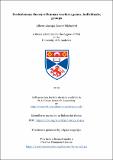Files in this item
Evolutionary theory of human warfare: genes, individuals, groups
Item metadata
| dc.contributor.advisor | Gardner, Andy | |
| dc.contributor.advisor | Ruxton, Graeme D. | |
| dc.contributor.author | Micheletti, Alberto Jacopo Cesare | |
| dc.coverage.spatial | xv, 246 p. | en_US |
| dc.date.accessioned | 2019-04-10T13:22:27Z | |
| dc.date.available | 2019-04-10T13:22:27Z | |
| dc.date.issued | 2019-06-26 | |
| dc.identifier.uri | https://hdl.handle.net/10023/17494 | |
| dc.description.abstract | Recent years have seen an explosion of multidisciplinary interest in coalitionary intergroup aggression – i.e. warfare – in human societies, and considerable advances in our understanding of its origins and evolutionary-ecological drivers. However, the study of human warfare has largely neglected the possibility that different parties – e.g. men versus women, younger versus older generations, or attacking versus defending groups – might have different incentives to influence the expression of warfare-related behaviours, which may result in conflicts of interest within and between groups and sex differences in behaviour. In this thesis, I develop a mathematical evolutionary framework, based on kin-selection theory, to investigate such differences in incentives, with special attention to sex-specific demography as a potential driver of conflicts of interest at multiple levels of the biological organisation. I find that: (a) the ecology of warfare can drive the evolution of sex-biased dispersal, which in turn modulates intrafamily and intragenomic conflicts over warfarerelated behaviours, with the latter leading to parent-of-origin-specific gene expression (genomic imprinting) and maladaptive behavioural disorders; (b) almost-exclusively male warfare can be driven by an evolutionary feedback between male and female participation in battle, rather than fundamental differences between the sexes; (c) sex is a fundamental modulator of altruism in the context of the demography of warfare, with the sex that competes more globally and/or is more philopatric being favoured to behave more altruistically towards same-sex groupmates than opposite-sex ones; (d) conflicts of interest within and between attacking and defending groups inhibit the formation of military alliances and the shift to large-scale human societies more generally. Taken together, these results suggest that differences in incentives for different parties in the context of warfare – often driven by sex-biases in demographic parameters – result in behavioural sex differences and conflicts of interest within and between different organisational levels. | |
| dc.description.sponsorship | "This work was supported by a full PhD scholarship, University of St Andrews (School of Biology)." -- Acknowledgements | en |
| dc.language.iso | en | en_US |
| dc.publisher | University of St Andrews | |
| dc.rights | Attribution-NonCommercial-NoDerivatives 4.0 International | * |
| dc.rights.uri | http://creativecommons.org/licenses/by-nc-nd/4.0/ | * |
| dc.subject.lcc | BF698.95M5 | |
| dc.title | Evolutionary theory of human warfare: genes, individuals, groups | en_US |
| dc.type | Thesis | en_US |
| dc.contributor.sponsor | University of St Andrews. School of Biology | en_US |
| dc.type.qualificationlevel | Doctoral | en_US |
| dc.type.qualificationname | PhD Doctor of Philosophy | en_US |
| dc.publisher.institution | The University of St Andrews | en_US |
| dc.rights.embargoreason | Embargo period has ended, thesis made available in accordance with University regulations | en |
| dc.identifier.doi | https://doi.org/10.17630/10023-17494 |
The following licence files are associated with this item:
This item appears in the following Collection(s)
Except where otherwise noted within the work, this item's licence for re-use is described as Attribution-NonCommercial-NoDerivatives 4.0 International
Items in the St Andrews Research Repository are protected by copyright, with all rights reserved, unless otherwise indicated.


